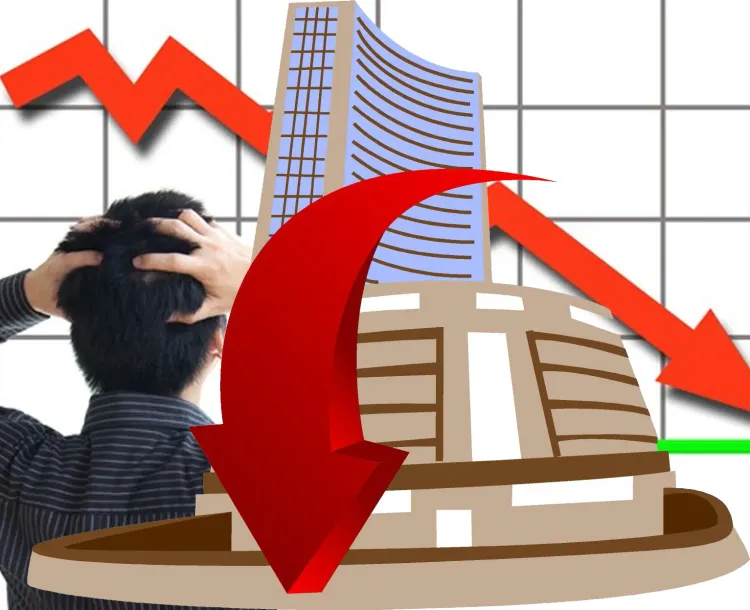Indian Stock Markets Plunge Following Global Sell-Off; Nifty Stays Above 22,100

Synopsis
Key Takeaways
- Indian markets faced a major sell-off amid global downturn.
- The Nifty closed above 22,100 despite sharp losses.
- Investor sentiment is cautious due to escalating global trade tensions.
- Sector performance varied, with metals and realty being the hardest hit.
- Upcoming US CPI data and RBI policy meeting will be pivotal.
Mumbai, April 7 (NationPress) The Indian stock markets experienced a significant sell-off on Monday due to a global downturn, with domestic benchmark indices suffering considerable losses – marking the steepest one-day decline since June 4 last year following the Lok Sabha election results.
Nevertheless, a minor recovery in the final trading session enabled the Nifty to rebound above the 22,100 threshold, mitigating some of the earlier losses.
The Sensex plummeted by 2,226.79 points, or 2.95 percent, to finish at 73,137.90. During the trading day, it fluctuated between an intraday peak of 73,284.24 and a low of 71,425.01. Investors faced a loss exceeding Rs 13.5 lakh crore at the close.
Similarly, the Nifty dropped 742.85 points or 3.24 percent to conclude at 22,161.60. Tata Steel suffered the most, declining by over 7 percent across both exchanges.
This steep decline followed the most significant drop in Asian markets in 14 years, instigated by a downturn in Wall Street.
The negative sentiment in the domestic market intensified after US President Donald Trump announced substantial tariffs, which prompted retaliatory actions from China.
This confrontation between two major global economies has heightened fears of a potential trade war, which could drive the world towards a recession.
"The market fell sharply as the devastation over elevated US tariffs and the retaliatory actions by other nations could ignite a trade war,” stated Vinod Nair of Geojit Investments Limited.
He further noted that while the overall effect on India might be limited compared to other countries, investors are encouraged to approach the market with caution during this turmoil.
“The emphasis will be on pure-play domestic themes, where a recovery is likely to be feasible once the turmoil subsides," Nair remarked.
The broader market faced significant selling pressure as well. Both the Nifty Midcap100 and Smallcap100 indices concluded over 3 percent lower.
In sector performance, metal and realty stocks were the most severely impacted. The Nifty Metal index decreased by 6.75 percent, while the Nifty Realty index fell by 5.69 percent.
Other sectors, including IT, banking, auto, and financial services, also recorded losses of up to 4 percent. Even a better-than-expected US job report, which usually boosts global sentiment, failed to reassure investors as trade issues took precedence.
According to Sundar Kewat of Ashika Institutional Equity, the decline was primarily influenced by rising global uncertainties.
“Negative cues from Wall Street -- which closed lower last Friday -- affected global markets, including India,” Kewat noted.
“Investor sentiment was adversely impacted amid increasing recession concerns, worsened by escalating global trade tensions,” he added.
Meanwhile, the Indian rupee experienced a slight decline against the US dollar, ending 61 paise lower at 85.84, compared to Friday’s closing of 85.23.
“The rupee is projected to trade within a broad range of 85.25–86.25, with heightened volatility expected in the near future," said Jateen Trivedi of LKP Securities.
Gold fluctuated within a range of Rs 87,900 and Rs 88,500 as markets processed the broader implications of the ongoing China-US tariff conflict.
Sentiment remained cautious, with investors seeking further clarity from the US regarding its future actions, particularly amid rising trade tensions.
The forthcoming US CPI data is anticipated to play a vital role in shaping rate cut expectations, which could influence gold's trajectory globally. Domestically, the RBI policy meeting later this week will be closely monitored, as rupee volatility is likely to introduce additional uncertainty for MCX Gold, according to Trivedi.









